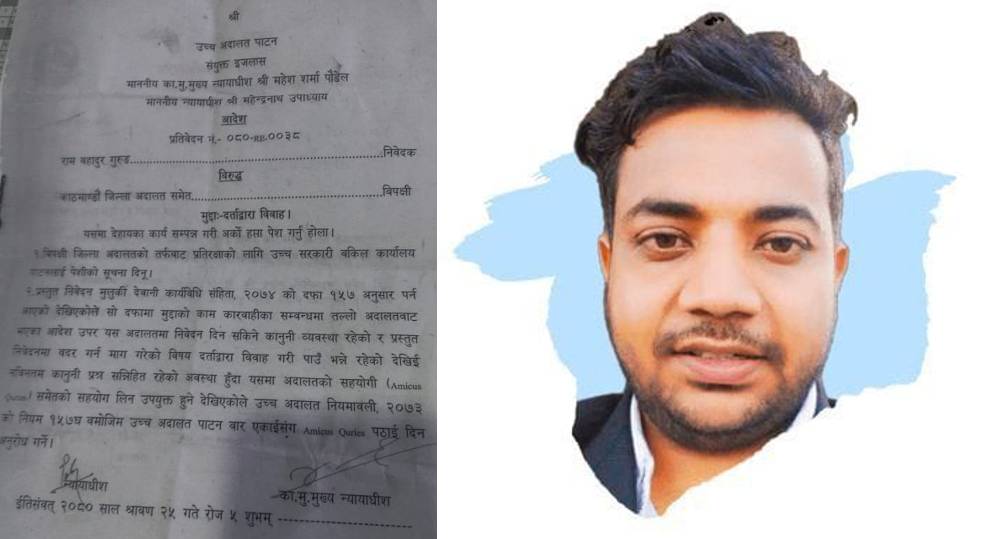
The legality and recognition of same-sex unions has been a divisive topic across the globe, with various nations taking varying approaches. Although there has been progress in Nepal toward accepting same-sex partnerships, there are still big obstacles to overcome. While registering same-sex unions is a positive development, it is important to understand that in order to truly secure the rights of LGBTIQ+ people, more extensive legal changes are required.
The Nepalese Supreme Court recognized the third gender category in 2008, setting a precedent in support of LGBTIQ+ rights. This paved the way for future progress, and in 2015, the nation accepted same-sex marriage, enabling LGBTIQ+ people to formally register their relationships.
The Supreme Court of Nepal once more declared in 2020 that same-sex marriages that are performed abroad must be registered by the government. Although it is not a perfect answer, this was a big triumph for the LGBTIQ+ population in Nepal.
Even with these encouraging developments, same-sex relationships still have many difficulties and restrictions. Although registration gives their relationships legal legitimacy, it does not provide total equality. There are still several heteronormative regulations in Nepal that limit the rights and privileges of same-sex partners in many areas of life, including inheritance, adoption, and spousal benefits.
There must be changes made to numerous other statutes in order for same-sex couples to enjoy complete equality under the law. For instance, marriage is now defined under the Civil Code of Nepal as a partnership between a man and a woman. It would be necessary to alter this term in order to permit same-sex unions in Nepal.
It is crucial for Nepal’s legislators to change current law in order to reflect shifting societal norms and defend the rights of LGBTIQ+ people in order to provide real equality for same-sex couples. These modifications ought to go beyond simply acknowledging same-sex unions and cover matters like family, inheritance, adoption, and work, among others. In order to guarantee that same-sex spouses have equal rights in areas like inheritance, property ownership, and child custody, further laws would need to be changed.
Registration alone is not a durable solution to the issue of same-sex marriage in Nepal. In order for same-sex couples to have full equality under the law, there need to be amendments to various other laws. These amendments would need to be comprehensive and would need to cover all aspects of marriage and family law. The process of amending these laws is likely to be long and difficult.
However, it is important for the LGBTIQ+ community in Nepal to continue to fight for their rights. With continued pressure, the government will eventually be forced to take action and ensure that same-sex couples have full equality under the law.
Same-Sex Marriage in Nepal: A Legal Crisis and a Journey towards Equality
In Nepal, same-sex couples must also overcome social and cultural obstacles in addition to legal ones. The majority of Nepali society is still conservative, and LGBTIQ+ persons face a lot of intolerance. Same-sex couples may find it challenging to live openly and for their relationships to be accepted by their families and communities as a result of this prejudice.
Despite the difficulties, there is a rising LGBTQ+ rights movement in Nepal. Numerous organizations are attempting to spread awareness of these problems and push for change. It is possible to attain complete equality for same-sex couples in Nepal with persistent effort.
While the legalization of same-sex unions in Nepal is unquestionably a step in the right direction, it is important to understand that it does not constitute a long-term solution. Comprehensive legal changes are needed to safeguard LGBTQ+ people’s rights and privileges in all facets of life in order to achieve true equality. By doing this, Nepal can lead by example and show that it is committed to protecting everyone’s human rights, regardless of their sexual orientation or gender identity.
Same-sex couples in Nepal face social and cultural barriers in addition to legal ones. In many areas of the country, homophobia and prejudice still exist, making it challenging for LGBTIQ+ people to live honestly and fearlessly. Legal changes as well as extensive educational programs to encourage acceptance and inclusivity are needed to address these ingrained biases.
The path taken by Nepal to accept same-sex marriage is consistent with the global movement to recognize the rights of LGBTIQ+ people. The nation can improve its standing as an ally in the fight for equality for all by altering its laws to permit same-sex unions.
Copyright © All right reserved to pahichan.com Site By: Sobij.